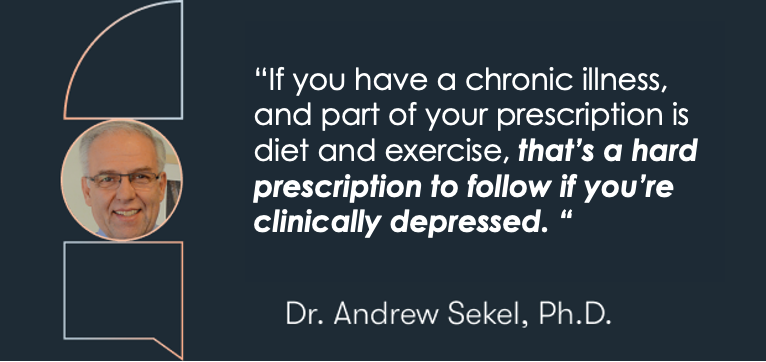
This article includes the text, as well as an audio and video file of Twill's interview with Dr. Andy Sekel, Ph.D., the Managing Partner at Marketplace Funds, and former Chief Executive Officer for Optum Specialty Networks.
We published the full interview with Dr. Sekel two weeks ago. You can find the full interview here.
In this excerpt from the interview, Twill's SVP of Sales, Brendon Kelly, asks Dr. Sekel, about the impact that mental healthcare can have on the management of chronic health conditions.
There are many immediate, COVID-related mental healthcare needs that can be addressed by a digital platform, but the technology's long-term impact will be in the way it is able to improve care management for many of our most costly chronic illnesses, and how it can close the gap for people impacted by social determinants of health (SDOH) that restrict access to traditional care.
Interview Excerpt Transcript
|
Brendon Kelly: It sounds like the system is broken, or at the very least not optimized. Dr. Andy Sekel, Ph.D.: There are different aspects of it that are optimized. If you live in a metropolitan area, there are probably a reasonable number of therapists, but you start getting into rural areas and, you start dealing with the issues of engagement and matching and, most of us don't in fact, think about our mental health in 50 minutes, once a week. We think about issues that come up during the week. We think about issues that happened yesterday, that you're struggling with. You know, the point I make later is digital offers an opportunity to provide more immediate care to those individuals versus once a week or twice a week for 50 minutes. That makes sense. If we look at those last three factors, they seem to have to do more with, with integration and impact, right? Brendon Kelly:Yes. I think those really have much to do with, how you activate people. How do you get data about the outcomes, and how do you manage them over time in a way that allows benefit to accrue for them? So, there are a couple issues that play into that. One: most of the behavioral health, unfortunately, is not very well integrated into general health, which means you might be getting services, but your general practitioner, or your specialist, might not know the severity of what you're dealing with. And then, a population that I became interested in when I was at Optum, was about individuals that have chronic illness. So, we tend to talk about behavioral health as thinking about our colleagues, our friends, or people we know that might need some help. But, there's a significant number of individuals that have a chronic illness. It's what President Obama called the, the 80% of expenses that go to 20% of the population. And these are individuals with diabetes or Parkinson's or chronic heart failure. And when we used to do studies at Optum, we found that individuals in that cohort, for the most part, have significant anxiety and depression to a pretty high degree. And when you think about it, it's not a surprise. If you had chronic heart failure and you knew that you're slowly in the process of really becoming incapacitated, you would have some anxiety and some depression related to it. Now the irony is if you have chronic heart failure, the prescription is besides medication, get more exercise and lose weight. Now, all of us have been depressed at some point. If you're depressed, the first thing that comes to mind is not going out for a long walk, or losing weight. So, you have these inconsistencies where individuals, because of their mental health co-morbidity, are struggling to meet the specifications for their primary diagnosis. And it's really life-threatening. So, part of what I was trying to do with this article was to open up the discussion about individuals with chronic illness who have very specific needs. Those populations have a high degree of comorbidity. That's really easy to understand. You could have had an entire life without ever having any serious mental health disorders. |
If you enjoyed this interview, we hope you'll attend our June 30 webinar with Dr. Sekel and his guests, Mike Thompson, President & CEO, of the National Alliance of Healthcare Purchaser Coalitions; Steven Blumenfield, Head of Strategy and Innovation, Health & Benefits NA, Willis Towers Watson; and Dr. Stuart Lustig, National Medical Executive for Behavioral Health, Cigna.
You May Also Like:
- Dr. Andrew Sekel's Editorial: A Digital First vs. Digitally Enhanced Approach to Behavioral Health
- The complete audio interview with Dr. Sekel: Where Mental Health Still Misses the Mark
- Download Our Guide: How (and Why) to Implement Digital First Behavioral Health Solutions

